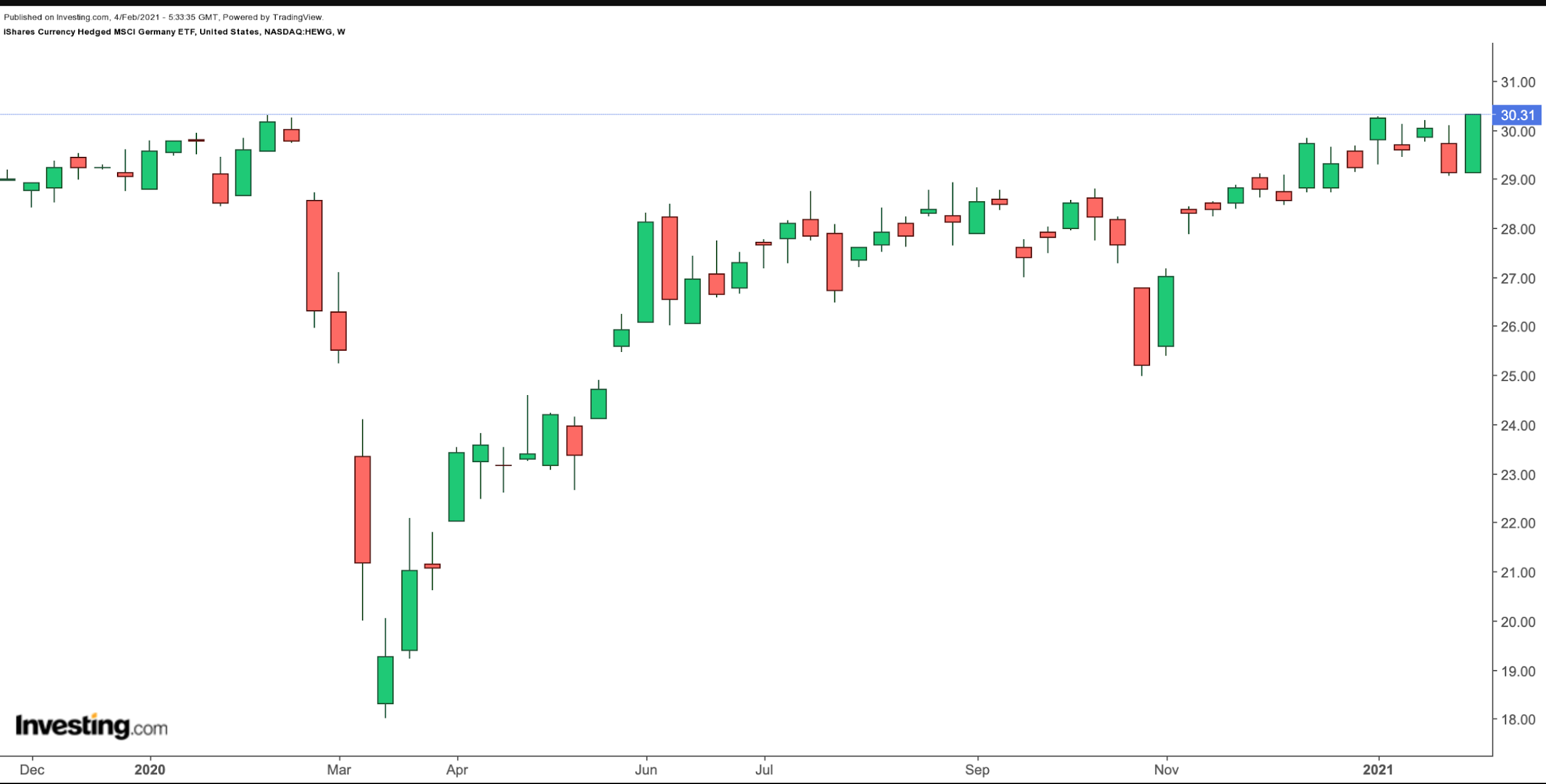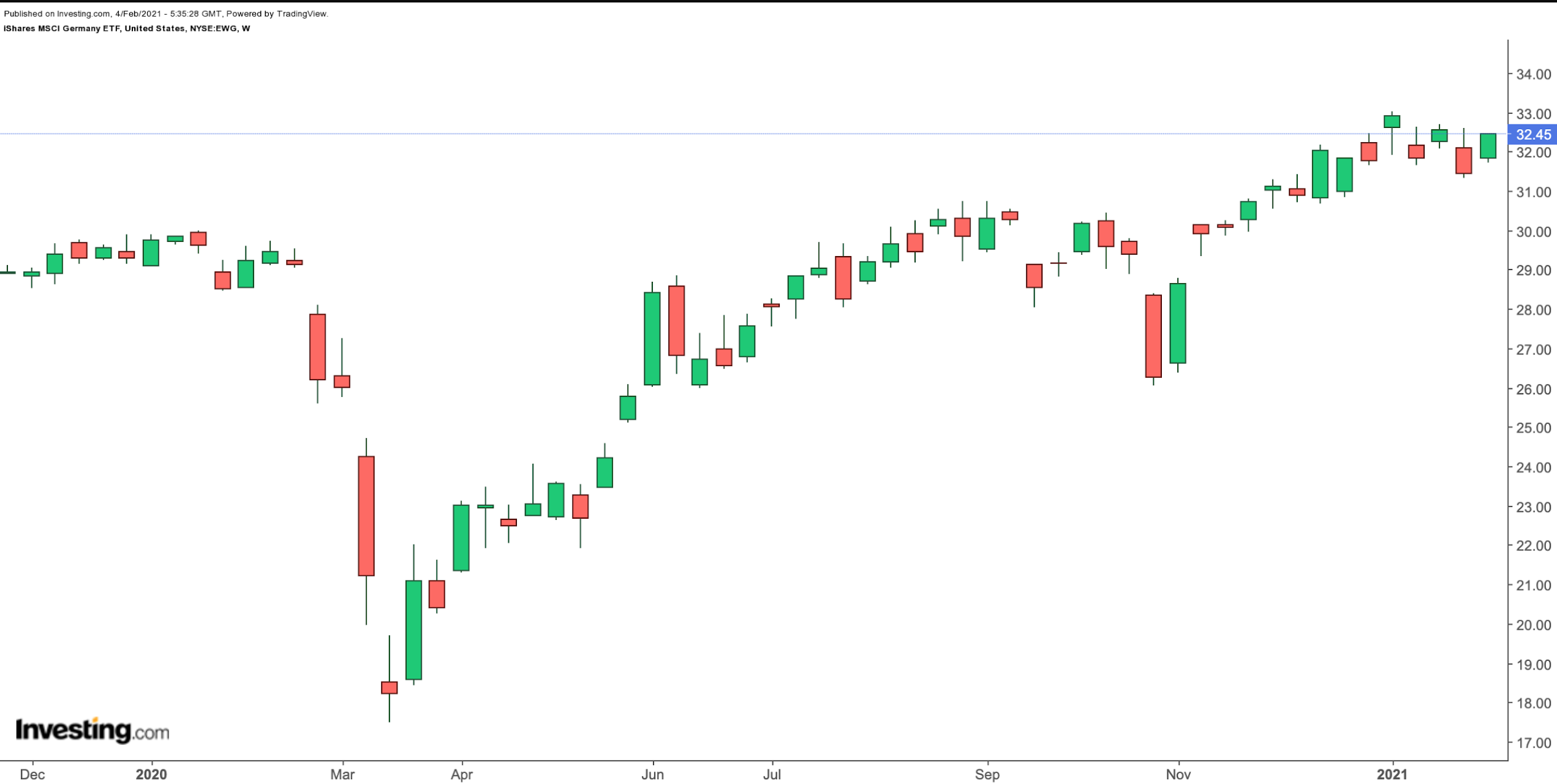For many investors, looking beyond equities in their home countries is not always easy. Yet, investing in stocks overseas could give access to global industry titans' growth and provide portfolio diversification.
One way to increase a portfolio's exposure to other countries would be to invest directly in high-quality global shares. Or consider consider an exchange-traded fund (ETF) that tracks the performance of a large number of stocks in a region or country.
Today, we will introduce an ETF that provides exposure to companies based in Germany.
The World’s Fourth-Largest Economy
Germany has the world’s fourth-largest economy, after the U.S., China and Japan. It is also the largest economy in the European Union. The Deutsche Bundesbank, the independent central bank of the country, provides regular updates on the state of the economy.
2020 was a difficult year for the German economy. KPMG notes:
“According to initial calculations by the Federal Statistical Office (Destatis), price-adjusted gross domestic product (GDP) was 5.0% lower in 2020 than in the previous year.”
The International Monetary Fund (IMF) suggests:
“Economic growth is expected to pick up in 2021 as vaccines become widely distributed, but output is not projected to return to its pre-crisis level before 2022.”
The automotive industry is the largest contributor to the German economy, followed by health care, information technology (IT) and telecommunications, mechanical and plant engineering, chemistry and pharmaceuticals, as well as electrical engineering and electronics. The country is also investing heavily in renewable energy sources and technologies.
Germany is a leading exporter. Its top trading partners include the U.S., France, China, the Netherlands, the UK and Italy. About half of the annual gross domestic product (GDP) is exported.
Last year, Mainz-based BioNTech (DE:22UAy) (NASDAQ:BNTX) became one of the most-widely followed companies, thanks to its partnership with Pfizer (NYSE:PFE) in developing one of the first successful vaccines against COVID-19.
The DAX index tracks the 30 largest German stocks listed on the Frankfurt Stock Exchange. However, we should note that as of September 2021, the index will have 40 companies. Over the past year, the index is up about 6%. By comparison, the S&P 500 returned over 18% in the past 12 months.
With that information, let’s take a look at our ETF for today.
iShares Currency Hedged MSCI Germany ETF
Current Price: $30.31
52-Week Range: $18.01 - $30.32
Dividend Yield: 2.47%
Expense Ratio: 0.53%
The iShares Currency Hedged MSCI Germany ETF (NASDAQ:HEWG) includes large- and mid-capitalization German equities. As a hedged fund, it also mitigates exposure to fluctuations between the value of the euro and the U.S. dollar.

Exchange rate moves affect returns on overseas investments. We previously covered how such hedged-currency funds could help protect against currency risk, which can work either against or in favor of an investor. Vulnerability to currency moves is more pronounced for short-term investors.
Ideally, a U.S. resident investing in the German market would like to see both the prices of German equities increase and the euro appreciate against the U.S. dollar. Thus, a fund like HEWG would ease the U.S.-based investor’s mind about potential currency moves that could decrease net returns.
HEWG primarily invests in another ETF, namely the iShares MSCI Germany ETF (NYSE:EWG) and hedges the currency risk by use of forward contracts.
Over the past year, HEWG is up about 5.5% and, year-to-date (YTD), it has returned more than 2.8%. By comparison, EWG is up 12.8% in the past year and 1.6% YTD.

Put another way, the fluctuation of the euro versus the greenback is the reason behind the difference in these two funds.
HEWG started trading in January 2014 and currently has about $62 million under management. On the other hand, EWG started trading in March 1996 and has $2.6 billion under management.
EWG currently has 63 holdings. The top 10 names comprise more than 50% of the fund. Siemens (DE:SIEGn), Allianz (DE:ALVG), BASF (DE:BASFN), Adidas (DE:ADSGN), Daimler (DE:DAIGn) are some of the largest holdngs.
Those buy-and-hold investors who believe the German economy and as a result, German equities, will improve in 2021 could consider investing in an ETF like HEWG around the current levels.
Bottom Line
Greater international exposure typically helps investors reduce the home-bias risk due to potential political or economic developments in their countries.
In addition to HEWG, there are other ETFs that focus on Germany. They include:
iShares MSCI Germany Small-Cap ETF (NYSE:EWGS) – up 5.6% YTD;
WisdomTree Germany Hedged Equity Fund (NASDAQ:DXGE) – up 3.1% YTD;
SPDR® EURO STOXX 50 ETF (NYSE:FEZ), which gives access to EU stocks including Germany – up 0.5% YTD.
